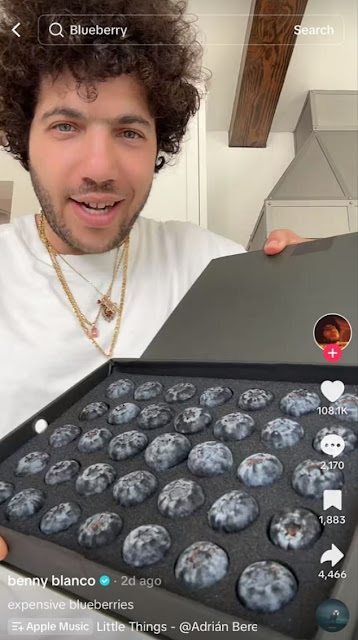In a display of extravagance that has ignited a firestorm of criticism, music producer Benny Blanco, engaged to pop superstar Selena Gomez, has drawn the ire of social media users after posting a video showcasing a luxury box of blueberries priced at a staggering $200. The video, reported by the Daily Mail on August 24, 2025, featured the 37-year-old proudly unboxing a sleek black package, with each oversized blueberry meticulously placed in its own compartment, as he marveled to his followers: “These blueberries they just sent me are the biggest things I’ve seen in the world. It’s like a meal. They are delicious. I think the boxes are like $200.” While Blanco’s enthusiasm for the lavish fruit was palpable, the reaction from fans was overwhelmingly negative, with many accusing him of flaunting his wealth insensitively during a global cost-of-living crisis. The incident has sparked a broader conversation about celebrity privilege, economic disparity, and the role of social media in amplifying public discontent. This article delves into the details of the controversy, the public’s response, the context of Blanco’s career and relationship with Gomez, and the deeper societal implications of the backlash.
The Video That Sparked a Firestorm
The controversy began when Benny Blanco, a prolific music producer known for his work with artists like Justin Bieber, Rihanna, and his fiancée Selena Gomez, shared a video on social media showcasing an opulent purchase: a $200 box of blueberries. The Daily Mail reported that the video depicted Blanco unboxing a sleek, black package designed with individual compartments for each blueberry, a presentation that underscored the exclusivity and extravagance of the product. With evident excitement, Blanco described the blueberries as “the biggest things I’ve seen in the world,” likening them to a meal and praising their taste, while casually noting the exorbitant price tag.
The blueberries, likely sourced from a luxury food purveyor specializing in high-end produce, represent a growing trend in the gourmet food market, where affluent consumers pay premium prices for meticulously curated items. Such products, often marketed as exclusive or artisanal, cater to a niche audience of celebrities, influencers, and wealthy individuals seeking unique culinary experiences. For Blanco, the video appeared to be a lighthearted moment of sharing his delight in a novel product. However, the timing and tone of his post struck a nerve with fans, many of whom are grappling with rising costs for basic necessities amid a global economic downturn.
Public Backlash: A Reflection of Economic Struggles
The reaction to Blanco’s video was swift and scathing, with social media platforms, particularly X, becoming a battleground for fans to express their frustration. The global cost-of-living crisis, characterized by soaring inflation, stagnant wages, and rising prices for essentials like food, housing, and energy, has left millions struggling to make ends meet. Against this backdrop, Blanco’s casual flaunting of a $200 box of blueberries was perceived as tone-deaf and insensitive, highlighting the stark divide between celebrity wealth and everyday economic realities.
One user on X encapsulated the sentiment of many, writing, “Sir, we’re not rich enough to relate to this.” Another commenter lamented, “Meanwhile I can’t even afford regular fruit,” underscoring the growing unaffordability of basic groceries for many households. In the United States, where Blanco resides, the Consumer Price Index (CPI) reported a 3.2% increase in food prices in 2024, with fresh produce like berries seeing even steeper rises in some regions. Globally, the United Nations Food and Agriculture Organization noted a 10% increase in food prices since 2022, exacerbating food insecurity in both developed and developing nations.
The backlash also took a creative turn, with some users drawing parallels to dystopian fiction. One commenter quipped, “It’s giving Hunger Games,” evoking the stark inequality depicted in Suzanne Collins’ novel, where the wealthy elite indulge in lavish feasts while the masses starve. The comparison resonated with many, as Blanco’s video seemed to symbolize a broader societal disconnect between the privileged and the struggling. Posts on X with hashtags like #BennyBlueberries and #CostOfLivingCrisis quickly gained traction, amplifying the outrage and drawing attention to the economic disparities fueling the criticism.
Defenders of Blanco: A Question of Personal Freedom
Not all reactions were negative, however. A small but vocal group of fans came to Blanco’s defense, arguing that his success as a music producer entitles him to spend his money as he pleases. “He earned his money and can spend it however he wants,” one supporter wrote on X, highlighting Blanco’s achievements in the music industry, which have earned him significant wealth. With a net worth estimated at $50 million, Blanco has built a career producing chart-topping hits like “Teenage Dream” by Katy Perry, “Love Yourself” by Justin Bieber, and “Wolves” by Selena Gomez and Marshmello. His financial success, coupled with his engagement to Gomez, one of the world’s most recognizable pop stars, places him in a rarified echelon of celebrity wealth.
Defenders also pointed out that Blanco’s video was not intended to provoke or belittle others but rather to share a moment of personal excitement. The blueberries, they argued, were likely a gift or promotional item, as Blanco mentioned they were “sent” to him, suggesting he may not have paid the $200 price himself. This perspective framed the video as a harmless expression of enthusiasm rather than a deliberate flaunting of wealth. However, these defenses were largely drowned out by the wave of criticism, as the majority of commenters focused on the insensitivity of showcasing such extravagance during a time of widespread financial hardship.
Benny Blanco and Selena Gomez: A High-Profile Romance
The scandal comes at a time when Benny Blanco and Selena Gomez are one of Hollywood’s most watched couples. The pair, who began dating in 2023 and announced their engagement in December 2024, have been open about their affection for each other, often sharing glimpses of their relationship on social media. Gomez, a global superstar with a career spanning music, acting, and entrepreneurship, has a massive following, with over 400 million Instagram followers as of August 2025. Blanco, while less visible in the public eye, has earned acclaim for his behind-the-scenes work, contributing to some of the biggest hits of the past two decades.
Their relationship has been a source of fascination for fans, particularly given their shared professional history. Blanco produced several of Gomez’s songs, including “Same Old Love” and “Kill Em with Kindness,” fostering a creative partnership that evolved into romance. The couple’s engagement, marked by a heartfelt Instagram post from Gomez featuring her ring and the caption “Forever starts now,” was celebrated by fans and celebrities alike. However, the blueberry scandal has cast a shadow over their public image, raising questions about how Gomez, who has been vocal about her mental health advocacy and relatability, might respond to the controversy surrounding her fiancé.
As of August 25, 2025, Gomez has not publicly commented on the blueberry video, leaving fans to speculate about her stance. Her silence may reflect a desire to avoid fueling the controversy, but it could also place additional pressure on Blanco to address the backlash. The couple’s ability to navigate this incident will likely depend on their communication strategy and whether they choose to address the criticism directly or let it fade from public attention.
The Cost-of-Living Crisis: A Global Context
The backlash against Blanco’s video cannot be fully understood without considering the global cost-of-living crisis, which has reshaped economic realities for millions. Since the onset of the COVID-19 pandemic, inflation has surged worldwide, driven by supply chain disruptions, energy price spikes, and geopolitical tensions. In the United States, inflation peaked at 9.1% in June 2022, the highest in four decades, and while it has since moderated, prices for essentials like food, rent, and utilities remain elevated. In Europe, energy costs driven by the Russia-Ukraine conflict have compounded financial pressures, while developing nations face acute food insecurity due to rising commodity prices.
For many, the cost of basic groceries has become a significant burden. In the U.S., the average price of a pint of blueberries rose to $5.50 in 2024, a 15% increase from 2022, according to the Bureau of Labor Statistics. In contrast, Blanco’s $200 box of blueberries—equivalent to the cost of a week’s groceries for a family of four in many households—symbolizes an unattainable luxury. This disparity fueled the outrage, as fans contrasted their struggles to afford “regular fruit” with Blanco’s casual display of wealth.
The crisis has also amplified public sensitivity to displays of affluence. Celebrities and influencers, once celebrated for their aspirational lifestyles, are increasingly scrutinized for appearing out of touch. Similar controversies have erupted in recent years, such as when Kim Kardashian faced backlash for showcasing a private island getaway during the pandemic or when influencers flaunted luxury purchases amid economic uncertainty. Blanco’s blueberry video fits into this pattern, serving as a lightning rod for frustration with systemic inequality.
The Luxury Food Market: A Growing Divide
The $200 blueberry box is emblematic of the growing luxury food market, where high-end retailers and brands cater to affluent consumers with exclusive, often exorbitant, products. Companies like Oishii, which specializes in Japanese-inspired strawberries priced at $50 for a pack of 11, and other purveyors of “artisan” produce have capitalized on the demand for unique culinary experiences. These products, often marketed as sustainable or hand-crafted, appeal to celebrities, chefs, and wealthy individuals seeking to elevate their dining experiences.
Blanco’s blueberries, with their individual compartments and sleek packaging, fit squarely into this trend. The exorbitant price reflects not only the quality of the berries—likely grown under controlled conditions to achieve exceptional size and flavor—but also the branding and exclusivity associated with the product. For affluent consumers, such purchases are a status symbol, akin to designer clothing or luxury cars. However, for the average person, they are a stark reminder of economic disparity, particularly when showcased by a public figure like Blanco.
The luxury food market’s growth has sparked debate about the ethics of conspicuous consumption. Critics argue that such products exacerbate inequality by normalizing extravagance while essential goods remain out of reach for many. Supporters, however, contend that the market drives innovation in agriculture and food production, creating jobs and supporting niche farmers. Blanco’s video, intentionally or not, has brought this debate to the forefront, highlighting the tension between personal freedom and social responsibility.
Social Media’s Role in Amplifying the Backlash
Social media, particularly X, played a pivotal role in amplifying the backlash against Blanco’s video. The platform’s real-time nature allowed users to react swiftly, with comments ranging from humorous jabs to pointed critiques of wealth disparity. The “Hunger Games” comparison, for instance, resonated widely, as it encapsulated the dystopian imagery of a privileged elite indulging in excess while others struggle. Hashtags like #BennyBlueberries and #LuxuryFruit trended briefly, drawing attention from both fans and detractors.
The incident underscores the power of social media to shape public narratives and hold celebrities accountable. Unlike traditional media, which may filter or delay stories, platforms like X allow for immediate, unfiltered reactions, creating a feedback loop that can escalate controversies rapidly. For Blanco, the viral nature of the backlash likely came as a surprise, as the video was intended as a lighthearted post rather than a statement on wealth. However, the incident illustrates the risks of sharing content that can be perceived as insensitive, particularly in a polarized economic climate.
Lessons for Celebrities and Public Figures
The blueberry scandal offers several lessons for celebrities navigating the public eye. First, it highlights the importance of context in social media posts. What may seem like an innocuous share to a celebrity can be interpreted very differently by an audience facing economic hardship. Blanco’s casual mention of the $200 price tag, without acknowledging the broader economic context, amplified the perception of insensitivity.
Second, the incident underscores the need for crisis management strategies. Blanco has not yet publicly addressed the backlash, which may allow the controversy to fester. A prompt response—whether an apology, clarification, or humorous acknowledgment—could have mitigated the criticism. For example, a statement emphasizing that the blueberries were a gift or part of a promotional campaign might have softened the narrative, framing the video as a quirky endorsement rather than a flaunting of wealth.
Finally, the scandal highlights the evolving expectations of celebrities in the age of social media. Fans increasingly demand authenticity and relatability, particularly from figures like Blanco and Gomez, who have built careers on connecting with audiences. Public figures must balance their personal freedom with an awareness of their platform’s impact, especially when their actions can be perceived as out of touch.
The Path Forward: Navigating the Fallout
For Benny Blanco, the path forward involves navigating the fallout from the blueberry video while preserving his reputation and relationship with Gomez. A public response, whether through social media or a media outlet, could help clarify his intentions and address the criticism. For example, acknowledging the cost-of-living crisis and expressing empathy for fans’ struggles could rebuild goodwill. Alternatively, leaning into the humor of the situation—perhaps by joking about the absurdity of $200 blueberries—could diffuse tension and align with Blanco’s playful public persona.
Selena Gomez’s role in the scandal remains uncertain, but her response could influence its trajectory. As a beloved figure known for her advocacy on mental health and social issues, Gomez has the opportunity to steer the narrative toward a positive outcome, perhaps by redirecting attention to charitable causes or community initiatives. The couple’s ability to weather this controversy will depend on their ability to communicate authentically and demonstrate sensitivity to their audience’s concerns.
Conclusion: A Tale of Wealth and Disconnect
The controversy surrounding Benny Blanco’s $200 blueberry video, reported on August 24, 2025, is more than a celebrity misstep—it is a reflection of the deep-seated frustrations fueling the global cost-of-living crisis. Blanco’s display of luxury, however unintentional, struck a nerve with fans struggling to afford basic necessities, sparking a backlash that highlights the growing divide between the wealthy and the working class. The incident, amplified by social media, underscores the power of platforms like X to shape public discourse and hold celebrities accountable.
As Blanco and Selena Gomez navigate the fallout, the scandal serves as a reminder of the responsibilities that come with fame and wealth. In a world where economic inequality is a pressing issue, public figures must tread carefully, balancing personal freedom with social awareness. The $200 blueberries, while a fleeting moment in Blanco’s career, have sparked a broader conversation about privilege, consumption, and the role of celebrities in an increasingly divided society. Whether Blanco can turn this controversy into an opportunity for growth and connection remains to be seen, but the incident will likely linger as a cautionary tale for others in the spotlight.






